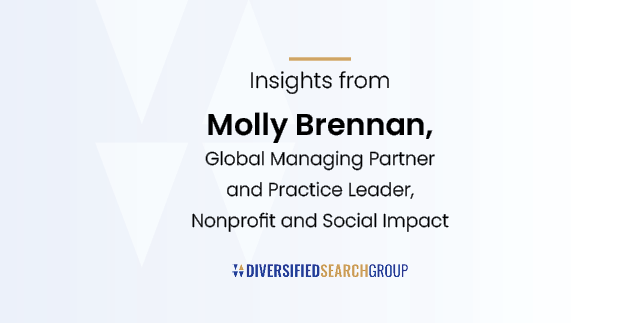11 Insightful Questions to Ask a Recruiter

By Molly Brennan, Global Managing Partner and Nonprofit and Social Impact Practice Lead, Diversified Search Group
Rather than ignoring the next email or call you get from a recruiter, think of it as a learning opportunity — even if you aren’t seriously considering leaving your current position. In most cases, the experience will help you learn about yourself as a job prospect and give you a sense of what employers are looking for — insights that can be invaluable when it is time to make a move.
Time and again, I’ve seen job candidates who weren’t even beginning to think about a career move completely change their perspective — and strategy — when presented with a compelling opportunity.
So, if you are contacted by a recruiter, consider asking the following:
Why is the position open? Find out whether it’s a newly-created role or an existing position that has become vacant. If the latter, ask why the person who occupied the position previously left and how long the position has been open.
What are the skills and experiences the hiring manager is prioritizing? Ask the recruiter to list the desired skills and experiences for the position. Having such a list will make it a lot easier for you to compare the employer’s requirements to your own skillset and decide whether it is worth pursuing the opportunity.
What does the day-to-day of the job look like? Asking this is a great way to get beyond the boilerplate of a job description and to really start to understand what the role entails. Is it a meeting-heavy position? Does it require research and/or writing? How much? How closely supervised is the position? Ask questions that will help you understand how you would be spending most of your time.
What can you tell me about the person to whom I would report? Research shows that the biggest reason people leave their jobs is their manager, not the work itself. Your manager is critical to your success and level of satisfaction. Ask the recruiter to tell you what the person who will be managing you is like, what she values, and how she prefers to operate.
Why did you reach out to me? What in my background suggests I’d be a good fit for the position? The answer to this question can help you understand how people outside your organization view your work and accomplishments, as well as how diligently the recruiter did her homework, which might also be an indication of how well they understand the position they’ve been hired to fill.
Is there anything in my resume or background that could be a concern? This is a great way to get a sense of how competitive you are for the role, and it will also provide information you can use to map out a strategy for addressing any perceived gaps in your cover letter, resume, and during the interview process.
What is the compensation range for the position? Asking about compensation up front shouldn’t impact your candidacy in any way. Indeed, the recruiter should be ready for this question and have no qualms about sharing a range. And remember, in many states it’s illegal to ask a candidate for a job what her current salary is, so don’t feel you have to share it if asked.
What kind of flexible work arrangements does the job offer? This is especially important information in the era of COVID, when many people have gotten used to working from home and may want to continue to do so. Understanding the range of benefits that come with the position is generally another good way to learn about the organization’s culture and values.
Tell me about the organization’s culture? What are its values and how do they show up in the organization’s work? For most people, organizational culture and values are critical factors in deciding whether to accept a position at a new organization. Ask the recruiter to provide details that go beyond what’s on the organization’s website or in a handbook and show how its values actually manifest themselves in its day-to-day activities. Ask, too, about professional development opportunities, its human resources practices, and all the other things that go into creating a vibrant organizational culture.
What work has the organization done to become more diverse, inclusive, and equitable? This is deeply important in 2021 to candidates who are seeking workplaces that are inclusive and equitable. Feel free to ask about the diversity of the staff, senior leadership team, and board of directors. Ask about diversity and equity-focused training and development opportunities. Additionally, don’t be hesitant to ask how the organization has responded to external events that have put a spotlight on racial injustice and equity.
What are the steps in and timeline for the interview process? The answer to this question should give you a sense of how much of a time commitment you’ll be asked to make if you want to pursue the opportunity and whether it is something that’s worth the investment of your time and energy.
The questions above are meant to be a starting point for determining whether a potential role may be a good fit and deciding whether you want to pursue an opportunity that a recruiter puts in front of you. Be creative and come up with some of your own. Moving to a new organization can be scary, but it’s also a great way — maybe the best way — to advance your career. Gather as much information as you can before making a decision and act accordingly.
Originally published on PND blog.
Molly Brennan is Global Managing Partner and Nonprofit and Social Impact Practice Lead at Diversified Search Group; and author of the 2019 report The Governance Gap: Examining Diversity and Equity on Nonprofit Boards of Directors. Her focus areas include leadership, retention, diversity, equity, and inclusion initiatives.
Related articles
-
?>
-

Education, Insights, Thought Leadership
Should You Join the Search Committee?
If your institution is going through a leadership transition, you might find yourself with the...
?>
-

Education, For Job Seekers, Insights, Thought Leadership
So You Want to Be a Head of School: Guidelines and Guardrails for Independent School Aspiring Heads
You understand the assignment, as today’s kids say. You know the Head’s role well, perhaps...
?>
-

For Job Seekers
Authenticity in Nonprofit Leadership
Merriam-Webster named authentic its 2023 word of the year. Forbes mentioned authenticity among the most...
?>
-

For Job Seekers
Authenticity in Nonprofit Leadership
Title: Authenticity in Nonprofit Leadership Merriam-Webster named authentic its 2023 word of the year. Forbes...
?>
-

Insights, News Category
PBJ: Philadelphia must embrace change, collaboration to unlock full potential
Judith M. von Seldeneck, founder and chair of Diversified Search Group, discusses the importance...
?>
-

Insights, Thought Leadership
Shelly Storbeck On Repairing Trust on College Campuses
Shelly Weiss Storbeck, Strategic Advisor for Diversified Search Group’s Education Practice and the founder of...
?>
-

For Boards, Search Committees and Hiring Managers, For Job Seekers
PND: Five Skills Every Nonprofit Leader Needs
Molly Brennan, Global Managing Partner and Practice Leader, Nonprofit and Social Impact, offers thoughts on...
?>
-

Insights
PBJ: Prioritizing AI is a necessity for leadership
Judith M. von Seldeneck, founder and chair of Diversified Search Group, explains that leadership must...
?>
-

For Job Seekers
Best Practices for Presenting Yourself and Networking
Networking is a critical for any professional. Whether you are looking for a new role...
?>
-

For Boards, Search Committees and Hiring Managers, For Job Seekers
9 Ways to Make Virtual Meetings More Inclusive
In addition to disruptions to most other areas of our lives, many of us have...
?>
-
For Job Seekers
How to Ask for an Informational Interview
Asking someone for an informational interview is an opportunity to build a reciprocal relationship...
?>
-

For Job Seekers
8 Easy Networking Tips for Busy People
We all know that networking is a key building block for professional advancement. But with...